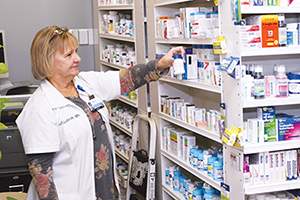By KEN LEISER
Safety net hospitals and health centers soon will have access to key pricing information for certain prescription medications they sell through a federal drug discount program that ultimately helps them treat vulnerable patient populations.

Pharmacist Judy Lubinski is at work in the outpatient pharmacy at AMITA Health GlenOaks Medical Center in Glendale Heights, Ill. The pharmacy fills prescriptions for patients being discharged from the hospital or receiving care in its clinics, including one that treats patients with the hepatitis C virus. Savings from the 340B program help the hospital provide potentially curative hepatitis C drugs to patients who would otherwise be unable to afford the therapy.
The Health Resources and Services Administration on Jan. 1 implemented provisions of the drug pricing program that subjects pharmaceutical companies to civil monetary penalties for "knowing and intentional" overcharges and requires disclosure of maximum per-unit, or "ceiling" prices. The administration said it would publish the price data on a secure website by April 1. The rule's implementation had been postponed multiple times and was set to take effect July 1, but the federal government moved up the date amid mounting pressure by health care providers.
Under 340B, pharmaceutical companies must sell certain outpatient drugs to eligible hospitals, health centers and clinics at a discounted price. These entities then can use the savings to provide care to low-income patients and other safety net services.
"We are very pleased that HRSA accelerated the implementation of the 2017 CMP (civil monetary penalty) final rule because we need — and have a right — to know whether we are paying the correct prices for the drugs we buy," said Bob Ripley, vice president and chief pharmacy officer for Trinity Health.
"This transparent information will be a critical source of truth, one we've been looking forward to for some time," he added.
Trinity Health, based in Livonia, Mich., has 33 hospitals that participate in the 340B drug pricing program, according to comments it submitted to the Health Resources and Services Administration in November. The program supports improvements to patient care, increased medication access and adherence, and decreased hospital readmissions in vulnerable communities, Trinity officials said in the comments.
Nationally, 12,823 providers and 29,663 associated sites participated in the drug discount program as of Jan. 1, 2018, according to the Department of Health and Human Services' Office of Inspector General.
Faced with reports that some participating hospitals were being overcharged, Congress passed protections as part of the Affordable Care Act in 2010. The protections included the secure, online pricing component that allows hospitals to review the discounted drug prices. A second provision opens drugmakers to civil fines for noncompliance with the program.
CHA had repeatedly urged the federal government to implement the rule immediately.
"Enforcement of 340B pricing is crucial for safety net and rural hospitals that rely on 340B savings to meet the needs of their communities," said Kathy Curran, CHA's Senior Director for Public Policy.
The new provisions originally were to take effect in March 2017. Since then, the implementation has been delayed five times, ultimately to July of this year.
The American Hospital Association and others filed suit in the U.S. District Court for the District of Columbia in September to force the federal government to implement the pricing rules by Jan. 1. The organization applauded the decision to move up the date.
"We continue to strongly urge (the Department of Health and Human Services) to make available online drug pricing information for 340B hospitals as this rule requires as soon as possible after Jan. 1, and no later than April 1, so that instances of drug overcharging can be uncovered, and penalties enforced," said Tom Nickels, executive vice president of the American Hospital Association.

Marcus
In a Nov. 30 update on the program, the Health Resources and Services Administration said the secure pricing component will be open to manufacturers to submit pricing data during the first quarter of 2019. The agency intends to publish ceiling prices on April 1.
AMITA programs
At AMITA Health, which serves the greater Chicago area, the 340B program permits the system to provide potentially curative treatment to those who test positive for hepatitis C, said Dr. Stuart Marcus, chief clinical officer at AMITA. "Without the 340B program ... it would be cost-prohibitive."
Savings from the 340B program also are used to operate a cancer center in a west Chicago safety-net hospital. The center would not be able to offer infusion services if not for the 340B program, said William Snyder, chief advocacy officer at AMITA. The program addresses an increased likelihood of cancer deaths among the poor.
"What we see in underserved communities in Chicagoland is that people living in low-income neighborhoods have a three- to five-times greater likelihood of dying from preventable cancers, like cervical cancer, and much later diagnosis of breast cancer," Snyder said.

Snyder
Savings from the 340B drug pricing program totaled about $20 million a year for AMITA, Snyder said. AMITA operates under a joint operating agreement between the Alexian Brothers Health System, part of St. Louis-based Ascension, and the Adventist Health System. Collectively, Ascension's participating hospitals invested nearly $195 million last year in charity care and community benefit programs using savings under the 340B program, according to comments Ascension submitted while the rule was under consideration.
Fifty hospitals within the Ascension system participate in the drug-discounting program. Those include 23 disproportionate share hospitals and 21 critical access hospitals, according to the Ascension comments. The remainder includes community hospitals, children's hospitals and rural referral centers.
"The story of the last few years is the skyrocketing drug prices," Snyder said. "And the 340B program becomes even more essential as we see these fluctuations in pharmaceutical pricing."